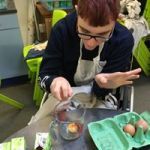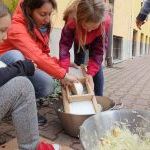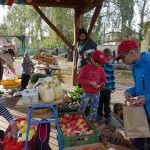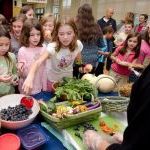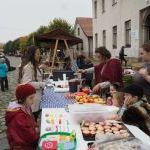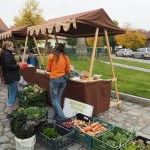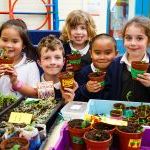School Farmers’ Markets
School farmers' markets are real farmers markets that take place in school halls, gardens or school playgrounds. They give school staff, pupils and their parents, as well as the general public, the opportunity to come and buy fresh local products. Pupils take part in their preparation and organisation under the guidance of teachers. It's a great way to build relationships with artisan producers and farmers in your region and help students know where food comes from and how much work it takes to produce it.
Website
School Farmers' Market Resource
Useful links
School Farmers' Market Introduction
School Farmers' Market Planner
Country
Media
* TOP TIP *
'Involve the children with job roles in planning and running the market to provide real-world learning opportunities'
How is the project linked to climate change & sustainability?
Setting up a farmers’ market in school has proven to be an exciting way of engaging pupils in key curriculum areas by providing a real-life situation with which pupils take the lead and have the opportunity to take ownership of their very own business enterprise. By engaging students into planning and organising the market, they learn where the food comes from and what impact producing, processing and distributing food has on the environment. The students are encouraged to become change-makers towards sustainable food production and consumption.
Who is involved?
The School Farmers Markets teaching pack is designed to provide teachers with a wide range of engaging and informative food and farming related activities. The pack gives pupils a chance to immerse themselves in an exciting eight week enterprise project in which they learn about food and farming.
The School Farmers Market is an eight-week project that allows pupils to learn about food and farming while developing curricula in new, exciting ways. Pupils can improve their environmental skills by thinking about where food comes from, how it is produced and distributed. Designing posters and flyers to promote an event can in turn develop their literacy and artistic talents.
How are the participants involved?
Running a market is an exciting journey that combines engaging educational activity in the classroom with a ‘wow day’ event. Pupils can take on different roles such as market manager, PR manager, logistics and cafe staff - each playing a role in planning and running the market. The whole market journey often takes place over the course of two or three months. Setting up a farmers’ market in school has proven to be an exciting way of engaging pupils in key curriculum areas by providing a real-life situation with which pupils take the lead and have the opportunity to take ownership of their very own business enterprise. School Farmers’ Markets are real world enterprise projects that allow children the opportunity to learn about food and farming, whilst also developing curriculum learning in new and exciting ways.
Key steps:
Week 1 - Starting: Think about what a farmers' market is, who to invite and what to sell.
Week 2 - Planning: Set a date and develop some business plans on how you are going to run the market.
Week 3 - Growing: Plant anything you are wishing to sell at the market in good time so that it is ready on the day.
Week 4 - Farming: Find out about local farmers and invite them to have a stall at the market.
Week 5 - Promoting: Design your promotional materials, social media and press releases and communicate to parents.
Week 6 - Preparing: Plan where producers will park, where you will place the stalls, and how the event will be run.
Week 7 - Cooking: Cook any produce to sell on a stall or in the cafe imediately before the market.
Week 8 - Launching: Ready to go! Welcome your visitors, help the farmers, sell your produce!

.jpg)
